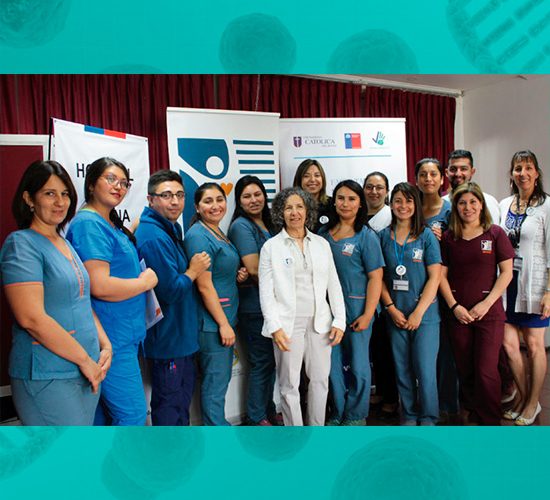Scientists lead the first population follow-up of a pandemic in Chile

During the month of April, more than 1000 participants from the Maule MAUCO Cohort, responded to the first international survey on COVID-19 applied in Chile, which aims to assess the physical and mental health of participants over time, in addition to their difficulties in stopping the crisis.
A multidisciplinary team of researchers led by two women scientists and epidemiologists from the first population cohort of maule MAUCO - of the ACCDIS Advanced Center for Chronic Diseases- adapted and applied to the Chilean reality the "COVID-19 Social and Psychological Survey: Perceived threat questionnaires, government response, impacts and experience on coronavirus" University of Montana in the United States. "The application of this survey, will allow us to know the psychological evolution, each person's perspectives and experiences during the epidemic, being the first time that in Chile you can study these kinds of phenomena and their development over time, in addition to comparing ourselves to other countries", reported Andrea Huidobro, LocalLy Responsible Epidemiologist of the MAUCO Study, Department of Preclinical Sciences at Maule Catholic University and coordinator of the implementation of the survey.
MAUCO is the first cohort in Chile to investigate since 2014 the factors that influence or prevent the development of chronic diseases in a commune in Chile, such as: cancer, cardiovascular disease and diabetes. In its population study, it includes 10.000 Molina residents between the ages of 38 and 74, surveys and sampling were conducted upon entering the study and are followed in time to assess the occurrence of health events, as hospitalizations, diagnosis of diseases or changes in their risk factors. The team of researchers is led by the epidemiologist of the Pontifical Catholic University Dra. Catterina Ferreccio, who is also a member of the COVID-19 advisory committee of the Ministry of Health and leads the development of this survey.
The scientific importance of the results of the COVID-19 Survey applied, is that they may be a reference for the rest of the Chilean population, this because "the demographic and health data of the population of the city of Molina are in the average of the data delivered by the National Health Surveys, in addition to other figures such as the average proportion of Chile's average urban and rural population", Dr. Huidobro indicated.
Due to the nature of an epidemic "it is necessary to know the psychological and health response of the population, this survey will be conducted permanently to the participants of the Cohort, which will allow us to have monthly results to know the evolution of perception, ATTITUDEs and coVID-19 issues in Chile and contrast them with the baseline data and samples that MAUCO has, in turn also compare them with international experiences of countries that apply the same survey" ended the epidemiologist Andrea Huidobro.
Top results of the top 1080 respondents:
Among the most frequently or prevalent aspects is participants' concerns about their health and that of their families, which reaches 80%, In addition, 62% of respondents admitted to avoiding physical contact with other individuals for fear of catching.
80% of the first 1080 respondents say they are afraid for their health and that of their families.
Another significant finding is that a third of the population surveyed confessed to avoiding news related to COVID-19. "This finding, tells us that we need to analyze the communication strategies and voices carried out so far. You have to study different channels of communication to get information to the whole community. Society needs to be informed of the progression of the pandemic in its region, trust the authorities and their decisions, to subsequently abide by the indications and measures imposed and to be able to effectively control this disease," dr.. Andrea.
In relation to the most difficult preventive measures to implement, you will find the use of masks where 42% report having problems when using them. "Educational campaigns need to be made from the correct use of these implements, nowadays many people don't know how to take them off, which ones can be washed and how to do it. For example, valve masks are recently being used to protect only the wearer, i.e., if this individual is a carrier of the virus through this mask it may infect other people", Doctor said. He also added, that "another difficult measure to comply was to avoid social gatherings and group interactions with children". This information should be taken into account when considering the return to school of children.
On the other hand, it is important to highlight the acceptance with which people have agreed to respond to the COVID-19 survey "the work has been very productive, the population feels supported by the Cohort and we have reached more than 90% participation", indicated Pía Venegas, MAUCO field coordinator.
Currently the field team only maintains contact with MAUCO participants by telephone, However, are working on the development of new strategies to open the facilities and be able to carry out the corresponding sampling. "In addition to taking into account all the health regulations of the authorities, we will implement our own prevention measures, for example: estrangement between appointments, compliance with schedules set for each participant, ban on escorts, among other requirements," commented the field coordinator, who also added that for worker safety "we are modeling the distribution of people within facilities and shift systems".
Enter here, for more information on the report of the first 1080 respondents.
